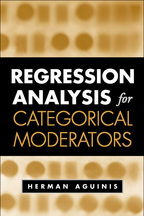Regression Analysis for Categorical Moderators
Herman Aguinis
This title is part of the Methodology in the Social Sciences Series, edited by Todd D. Little, PhD.
“A masterful presentation reflecting many years of research and study. It should prove to be valuable to any researcher who has even a basic understanding of statistical analysis.”
—International Journal of Consumer Studies
“Aguinis has produced the most comprehensive single-source treatment on the topic of why and how to conduct moderated regression analysis for categorical moderators. The book presents very clear steps for how to test for moderators, but is more than a cookbook in that it also explores in detail the underlying assumptions; issues that will affect interpretation (e.g., homogeneity of variance and power); and solutions to frequently encountered problems. Examples from different types of research problems help clarify the analytical strategy, and presentation of the software for examining underlying issues is very valuable. Aguinis also provides excellent coverage of the literature surrounding the analytical strategy. This volume is an excellent reference for any researcher or student interested in studying interactions with categorical variables.”
—Sheldon Zedeck, PhD, Department of Psychology, University of California, Berkeley
“This book presents a complete and current treatment of a topic of great importance to management and organizational studies researchers. Strengths of the book include the use of an integrative example with data that is available to readers, and the clear presentation style. The treatment of homogeneity of error variance and statistical power problems is especially impressive and provides readers with practical guidance for dealing with these issues. This book will be an excellent resource for any researcher who works with regression models.”
—Larry J. Williams, PhD, Center for the Advancement of Research Methods and Analysis, School of Business, Virginia Commonwealth University
“Aguinis has provided an extraordinarily understandable guide to conducting tests of moderation by categorical variables. The book contains clear examples for running the analyses, checking assumptions, and interpreting the results. This book is an excellent resource for courses on regression analysis at both the undergraduate and graduate levels, and for individuals who need a refresher on moderator analysis.”
—Lois Tetrick, PhD, Department of Psychology, George Mason University
Table of Contents
1. What Is a Moderator Variable and Why Should We Care?Why Should We Study Moderator Variables?
Distinction between Moderator and Mediator Variables
Importance of A Priori Rationale in Investigating Moderating Effects
Conclusions
2. Moderated Multiple Regression
What Is MMR?
Endorsement of MMR as an Appropriate Technique
Pervasive Use of MMR in the Social Sciences: Literature Review
Conclusions
3. Performing and Interpreting Moderated Multiple Regression Analysis Using Computer Programs
Research Scenario
Data Set
Conducting an MMR Analysis Using Computer Programs: Two Steps
Output Interpretation
Conclusions
4. Homogeneity of Error Variance Assumption
What Is the Homogeneity of Error Variance Assumption?
Two Distinct Assumptions: Homoscedasticity and Homogeneity of Error Variance
Is It a Big Deal to Violate the Assumption?
Violation of the Assumption in Published Research
How to Check If the Homogeneity Assumption Is Violated
What to Do When the Homogeneity of Error Variance Assumption Is Violated
ALTMMR: Computer Program to Check Assumption Compliance and Compute Alternative Statistics If Needed
Conclusions
5. MMR’s Low-Power Problem
Statistical Inferences and Power
Controversy Over Null Hypothesis Significance Testing
Factors Affecting the Power of All Inferential Tests
Factors Affecting the Power of MMR
Effect Sizes and Power in Published Research
Implications of Small Observed Effect Sizes for Social Science Research
Conclusions
6. Light at the End of the Tunnel: How to Solve the Low-Power Problem
How to Minimize the Impact of Factors Affecting the Power of All Inferential Tests
How to Minimize the Impact of Factors Affecting the Power of MMR
Conclusions
7. Computing Statistical Power
Usefulness of Computing Statistical Power
Empirically Based Programs
Theory-Based Program
Relative Impact of the Factors Affecting Power
Conclusions
8. Complex MMR Models
MMR Analyses Including a Moderator Variable with More Than Two Levels
Linear Interactions and Non-linear Effects: Friends or Foes?
Testing and Interpreting Three-Way and Higher-Order Interaction Effects
Conclusions
9. Further Issues in the Interpretation of Moderating Effects
Is the Moderating Effect Practically Significant?
The Signed Coefficient Rule for Interpreting Moderating Effects
The Importance on Identifying Criterion and Predictor A Priori
Conclusions
10. Summary and Conclusions
Moderators and Social Science Theory and Practice
Use of Moderated Multiple Regression
Homogeneity of Error Variance Assumption
Low Statistical Power and Proposed Remedies
Complex MMR Models
Assessing Practical Significance
Conclusions
Appendix A. Computation of Bartlett’s (1937) MStatistic
Appendix B. Computation of James’s (1951) J Statistic
Appendix C. Computation of Alexander’s (Alexander & Govern, 1994) A Statistic
Appendix D. Computation of Modified f2
Appendix E. Theory-Based Power Approximation
References
Name Index
Subject Index
